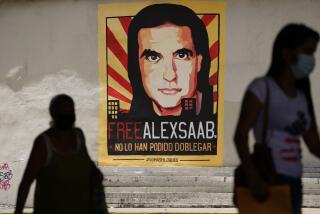Escobar’s Surrender
- Share via
In your editorial of June 21, you consider Pablo Escobar’s surrender to be the result of a “cynical deal” between the Colombian government and the drug trade, which you state “smells like the proverbial deal with the devil.” I have fundamental reasons to believe that my information on this issue is hot and from a reliable source. I would therefore dare to assert without a doubt that the terms for the surrender of the most dangerous enemy of U.S. public health were established previously by presidential decrees, and that the conditions set for his turning himself in referred only to his security in prison.
This is a good opportunity to recall that in bargaining with criminals, few bodies of law are as permissive as that of the United States, particularly with regard to sentence reductions for informing or other more or less abominable types of assistance. Furthermore, the subsequent security of informers is protected by such crafty schemes as surgical face changes and the issuance of new identification documents.
In any case, the most memorable deal between a government and illicit traffickers is not that of Colombia with Pablo Escobar, but that of the U.S. with gangster Lucky Luciano to procure his collaboration, along with accomplices in Italy, in the secret preparations for the Allied landing in Sicily in World War II. The legitimacy of this genuine deal with the devil has been justified by history through the certain benefit of having hastened the end of the war and the advent of world peace. Well, friends, Colombia’s peace and the end of terrorism are as valuable to us, and as worthy of our intelligence and your understanding, as is world peace.
GABRIEL GARCIA MARQUEZ
Mexico City
More to Read
Sign up for Essential California
The most important California stories and recommendations in your inbox every morning.
You may occasionally receive promotional content from the Los Angeles Times.













